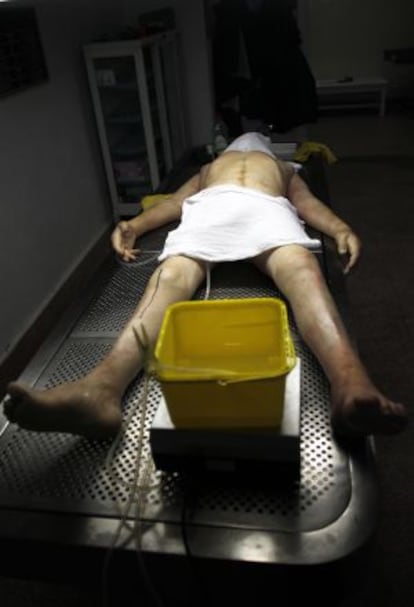The dirty money hidden beneath a pile of bodies at Madrid’s top university
Technicians at anatomy department received cash-in-hand payments in exchange for body parts


Technicians at the faculty of medicine at Madrid’s Complutense University say they received cash-in-hand payments of around €100 to €150 a day for preparing materials and cadavers for “courses” held outside of normal university hours.
The finding comes in the wake of revelations published by El Mundo newspaper last month that hundreds of corpses donated for scientific study had been piling up in the university’s Anatomy II department for the last six months in unhygienic conditions.
The university put the problem down to staff shortages caused by cutbacks and ordered the disposal of the bodies. The head of the Anatomy II department, José Ramón Mérida, resigned over the scandal, while labor inspectors ordered the suspension of all activity at the department’s crematorium because of health risks.
New revelations now point to the fact that economic interests – and not just laziness, neglect and a lack of resources – may have been behind the buildup of bodies in the basement of the Complutense’s faculty of medicine.
According to university labor union sources, who have been accompanying the inspectors investigating the department’s employees, the accounts of one technician show that they carried out at least 23 activities involving cadavers, mainly in the fields of dentistry and ophthalmology, in the past year. They were listed under the heading of “continuous training courses,” or “renting out of spaces” (with body included), two uses of the installations permitted by university management.
Nevertheless, according to the same sources and the technician’s records, only one of the courses is documented as a regular payment in the workers’ monthly paychecks from the Complutense Foundation. The rest may have been paid under the table.
If anyone has been paid cash in hand, it is completely illegal; they are paid by monthly paycheck” Complutense University President José Carrillo
“The subject of courses comes under the umbrella of reserved information,” university president José Carrillo said on Monday, adding that inspectors had opened an investigation and the results would be made public in a few weeks.
“If anyone has been paid cash in hand, it is completely illegal; they are paid by monthly paycheck. A department cannot have its own financing system through parallel accounts; it is illegal,” he said.
At least one of the department’s technicians, who refused to speak directly to EL PAÍS, recorded all the body parts that they had prepared for the courses. “She was scared to death,” said one labor union source. “On occasion they had to work extra hours and be present during the activities and they paid them cash in hand – but they didn’t even get €10 an hour. But other times they asked them to leave everything prepared in the dissection rooms on Friday afternoon and then they tidied up on Monday, when they got in, and in these cases they didn’t pay them,” said the sources.
Jesús Bragado, manager of the medical faculty, told EL PAÍS that “all the courses that are official go through management.” But are there unofficial courses? “Courses that aren’t of an official nature are carried out, but it is better that the vice-dean of academic management informs you about that.”
Departments are resorting to extra activities to pay for the resources that allow them to operate at a certain level
Companies, conferences and private individuals supposedly hired the spaces for the courses, which, say labor union sources and the vice-dean of academic management, Jorge García Seoane, were coordinated by the Anatomy II department. “They come under the direct responsibility of the department and are regulated depending on the organization with which they sign the contract. Ask them, because if it’s not about university students, it has nothing to do with me,” Seoane said.
So-called “continuous training courses” and “the renting out of spaces” are two forms of collecting extra revenue stipulated and regulated by university management. The cuts suffered in the crisis and recent education policy have made their mark on the scientific activity and research at the university and many departments are resorting to these activities to pay for the materials and resources that allow them to go on operating at a certain level, explained Professor José Ramón Sañudo, director of the Complutense’s Anatomy I department – “the good one,” which keeps an average of 80 cadavers in polythene bags on its shelves for the purposes of study.
Tu suscripción se está usando en otro dispositivo
¿Quieres añadir otro usuario a tu suscripción?
Si continúas leyendo en este dispositivo, no se podrá leer en el otro.
FlechaTu suscripción se está usando en otro dispositivo y solo puedes acceder a EL PAÍS desde un dispositivo a la vez.
Si quieres compartir tu cuenta, cambia tu suscripción a la modalidad Premium, así podrás añadir otro usuario. Cada uno accederá con su propia cuenta de email, lo que os permitirá personalizar vuestra experiencia en EL PAÍS.
¿Tienes una suscripción de empresa? Accede aquí para contratar más cuentas.
En el caso de no saber quién está usando tu cuenta, te recomendamos cambiar tu contraseña aquí.
Si decides continuar compartiendo tu cuenta, este mensaje se mostrará en tu dispositivo y en el de la otra persona que está usando tu cuenta de forma indefinida, afectando a tu experiencia de lectura. Puedes consultar aquí los términos y condiciones de la suscripción digital.








































